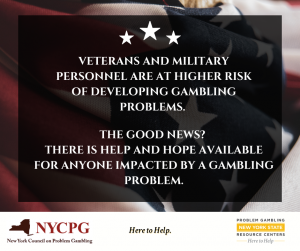A Hidden Risk Among Our Veterans
In November, we celebrate National Veteran Month and Military Families Month. It is a time to reflect on the sacrifices that our nation’s military and military families make every day. Our nation’s veterans and service members face challenges that many of us will never know. The families of those individuals show strength, courage, and resiliency as they love and support those that serve. They put their lives on hold, adjust to new living situations and communities so that their loved ones can continue to serve our nation.
This month we highlight the unique challenges that our service members face as well as the impact it may have on their families in relation to problem gambling. We want both service members and their families to know that there are support and resources available to anyone who has been impacted by problem gambling.
Why do Veterans and Military Personnel Gamble 
There can be many reasons why those in the military may gamble. Life in the military is quite different than civilian life. Military members may turn to gambling to pass time, escape stress and cope with emotions. Opportunities to gamble are vast, especially on base and overseas. On base slot machines, friendly sports wagers, and simple card games can serve as recreation, but can quickly spiral out of control.
Problems with gambling can also impact family members back at home. Problem gambling can lead to financial issues, lack of trust, and relationship issues. When you add in the stress of a deployment or a return to civilian life, these problems can be magnified.
Recent research by the University of Nevada, Las Vegas (UNLV) and Bowling Green State University has indicated that problem gambling is 3.5 times higher among active military personnel compared to the general population. In addition, research shows that active-duty service members seek help for problem gambling at significantly lower rates than the civilian population, often out of fear of facing negative consequences on their military career.
The Facts
We know that Veterans are at a higher risk of developing a gambling problem. We also know that problem gambling is often referred to as the hidden addiction. It is important to understand why Veterans and Military members are at a higher risk, as well as know where help is available.
- Veterans with PTS have a 60% higher rate of gambling addiction than the general population.
- Problem gambling often co-occurs with depression, anxiety, post-traumatic stress (PTS) and traumatic brain injury (TBI).
- 44% of veterans in treatment for problem gambling reported making suicide attempts.
- 66.4% of veterans seeking treatment for gambling disorder reported a lifetime history of substance abuse or dependence.
- Gambling disorder is the second strongest predictor of homelessness among veterans, second to illicit drug use.
Where to Get Help
This November lets raise awareness about the impact problem gambling can have on Veterans, Active-Duty Military, and their families. If someone you know is struggling with their gambling, know that help and hope are available.
The New York Council on Problem Gambling operates seven regional Problem Gambling Resource Centers across the state. Together these centers work in partnership with the NYCPG Veteran Outreach Coordinator. Reach out to your nearest PGRC for resources, guidance, and confidential support. www.NYProblemGamblingHELP.org
